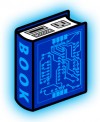 I. Introduction
I. Introduction
After several years of false starts, the universe of digital books seems at last poised to expand dramatically. Readers should view this expansion with both excitement and wariness. Excitement because digital books could revolutionize reading, making more books more findable and more accessible to more people in more ways than ever before. Wariness because the various entities that will help make this digital book revolution possible may not always respect the rights and expectations that readers, authors, booksellers and librarians have built up, and defended, over generations of experience with physical books.
As new digital book tools and services roll out, we need to be able to evaluate not only the cool features they offer, but also whether they extend (or hamper) our rights and expectations.
The over-arching question: are digital books as good or better than physical books at protecting you and your rights as a reader?
Below we offer a checklist that can help guide your inquiry, as well as an extended explanation of why the answers to these questions matter. Not surprisingly, some of the issues overlap. For example, Digital Rights Management, or “DRM,” matters not only because of the limits it places on users, but because of its impact on innovation and competition. Yet by separating out the various issues, we hope to spur a more rigorous consideration of the various digital book offerings.
Our goal is not to tell authors, publishers, vendors, libraries, or anyone else what strategies they must adopt, or tell book purchasers what options they must choose. We hope that a robust marketplace emerges, with various business models and technologies. Instead, this checklist represents the key questions that readers should ask of each new digital book product or service to evaluate whether it adequately protects their interests. That sort of rigorous inquiry will help us decide which digital book future we want — and how to vote with our feet until we get it.
II. EFF Digital Book Checklist for Readers:
- Does it (your e-book reader/service/tool, etc.) protect your privacy?
- Does it limit the tracking of you and your reading?
- Does it protect against disclosure of your reading habits?
- Does it give you control over the information it collects about you?
- Does it tell you what it’s doing with the information it collects and can you enforce its commitments to you?
- Does it tell you what it is doing?
- How clear are the disclosures? Will they be updated and, if so, how?
- Does it let you or others investigate to confirm that the product, device or service is actually functioning as promised?
- What happens to additions you make to books you buy, like annotations, highlights, commentary?
- Can you keep your additions?
- Can you control who has access to your additions?
- Do you own the book or just rent or license it?
- Can you lend or resell?
- Is it locked down or do you have the freedom to move it to other readers, services or uses?
- Can the vendor take it away or edit it after you’ve purchased it?
- Is it censorship-resistant?
- How easy is it to remove or edit books once access or possession has been given to readers?
- Is there a single entity that stores all the books, as in Google Books or the Kindle, such that political or legal pressure on that place might result in a loss of the work for all readers?
- Are the books stored in a location where censorship is historically a problem, such as China or Saudi Arabia, or in a place that is relatively free of censorship?
- Are the copyright or other laws applicable to the books balanced, giving readers the protection of doctrines like fair use or copyright exceptions and limitations?
- Is it burdened with digital rights management (“DRM”)?
- Is there DRM? If so, how does the DRM limit your use of the book? Can you still lend, give or resell the book? What features are enabled and/or disabled?
- Are you locked into a single technology or a group of technologies, or can you choose any device you wish to read and otherwise use your book?
- Has the DRM been studied by independent researchers to confirm that it causes no security or other problems?
- Does it report on your activities or otherwise violate your privacy?
- Does it promote access to knowledge?
- Can authors and publishers easily dedicate their books to the public domain, or use Creative Commons or other flexible licensing schemes?
- Can you trust your “digital librarian” to enable access to as many works as possible?
- Is it available to people without money, as public libraries are?
- Is it cost-effective for people of limited means?
- Is it available to people with disabilities?
- Does it foster or inhibit competition and innovation?
- Can books from this source be read on a variety of readers or formats or are you locked into a single format or reader? Conversely, can you read or access books from a variety of sources?
- Can the device or service features be easily added or modified by users or third parties or must features be pre-approved by the provider?
- Does the provider depend on or promote agreements that limit competition?
This article was published by the Electronic Frontier Foundation under the Creative Commons Attribution License. An extended version of this article is available here. It is also available as a PDF.







